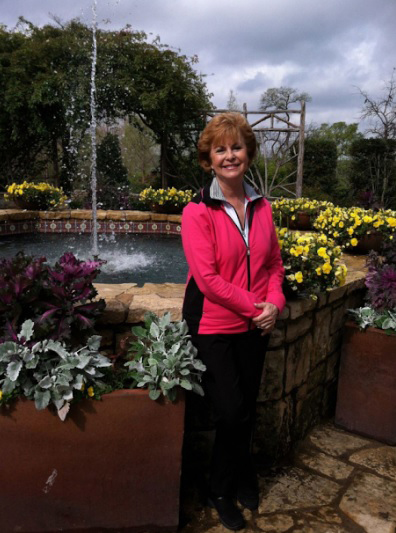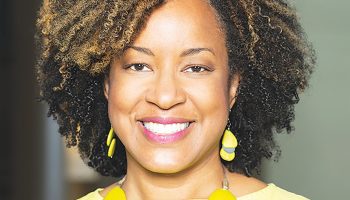
In 2015, to honor her friend and fellow feminist, Barbara Ann Ellison Vackar, Chautauqua Foundation Board of Directors Chair Cathy Bonner established a special annual lecture within the Chautauqua Women’s Club’s Contemporary Issues Forum.
This season’s Barbara Vackar Lecture will be the fourth and final presentation in the series. Vackar died unexpectedly in her New Braunfels, Texas home on Nov. 28, 2017. She was 74.
The Women’s Club will honor Vackar, who served as its president from 2005 to 2010, at 3 p.m. Saturday, July 28, in the Hall of Philosophy. Former Chautauqua Institution president Tom Becker will speak.
Afterward, there will be a garden dedication and reception at the CWC House — Vackar was a master gardener, floral designer and watercolorist in her spare time.
The celebration of her life will follow the 2 p.m. Vackar Lecture in the Hall of Philosophy, which will be given by political strategist Glynda Carr, co-founder of Higher Heights for America, a national organization focused on strengthening the civic participation of black women in grassroots advocacy campaigns and the electoral process.
Given Vackar’s passion for public service and for championing women’s causes and rights, Carr’s lecture could not be more appropriate. Brought up in a political family with a father who progressed from county attorney to district judge, Vackar was elected to the student council each year beginning in fourth grade and continuing through college at Texas State University.
With her home economics degree in hand, Vackar advanced from planning meals for the TSU football team to directing special events for the president of the University of Texas in Austin. She so enjoyed planning things and leading others that 13 years later, she left to start Adams Vackar Caterers.
After Vackar planned a luncheon at UT in honor of Lady Bird Johnson, Johnson and the Lyndon Baines Johnson Presidential Library became primary clients.
The difficulty Vackar had as a woman trying to establish financial credit in her own name when she first moved to Austin prompted her to take action on behalf of all Texas women. For advice on securing credit — so that fathers and husbands would not have to sign for their daughters and wives — she turned to Texas state representative and attorney Sarah Weddington, and began lobbying for state legislation and volunteering at the capitol.
Vackar also worked to get women on bank boards — where the money was — and initiated consumer and debt counseling within Austin’s Family and Children’s Services so that women could stop fighting for money and attend to their families and other responsibilities.
A new opportunity arose when the activities of Vackar’s catering partner hurt the company. She founded Vackar Associates, a political advertising, consulting and lobbying firm that guided the community involvement of CEOs and presidents new to Austin, and lobbied at all levels of government.
While lobbying for passage of the Equal Rights Amendment, Vackar met Bonner through the Women’s Political Caucus in Austin. Both were in their 20, and believed that women wouldn’t get anywhere without the ERA, and that having money and running for election were imperative for women.
When Vackar was just 30, Weddington put her in charge of Texans for ERA, a large coalition of organizations throughout the state that were opposed to the efforts of the anti-feminist, Phyllis Schlafly-affiliated “Pink Ladies,” who were trying to rescind Texas’ ratification of the ERA.
In 1978, when President Jimmy Carter appointed Weddington as his special assistant, she convinced Vackar to move temporarily to Washington, D.C., without her husband and their young son, Blake, to develop the White House’s strategy for acquiring the final three states it needed for ERA ratification — Florida, North Carolina and Oklahoma.
Upon returning to Austin, Vackar was elected cochair of the Travis County Democratic Party and became its official spokesperson. Several year later, while she was married to her second husband, Bruce Todd, she served as Austin’s first lady and launched the “Keep Austin Beautiful” campaign.
In 1996, Chautauquan Barbara Miller, a professional communications consultant and certified mediator, invited Vackar, Bonner, Betsy Martin, and other women friends from Austin to celebrate Miller’s 50th birthday at Chautauqua.
Vackar would return to Chautauqua every season for the next 21 years and become immersed in the activities and leadership of the CWC.
To explain its historical influence, she obtained funding for and archival assistance with the production of a short video. In 2013, Vackar did the research, Martin (who created the renowned public education campaign against highway litter, “Don’t Mess with Texas”) wrote the script, and Miller narrated a seven-minute film about the CWC, “And the Beat Goes On.”
That title also suited Vackar. She was known for singing show tunes spontaneously, dancing to Motown music, and — after Wynton Marsalis wowed her throughout Week Nine of the 2016 season — appreciating jazz. Thanks to Vackar, dance music pervaded the CWC at least once each summer.
Vackar was preceded in death by Ron Coleman, her partner in life and in pickleball, whom she had known since eighth grade in Gonzales, Texas, and dated in high school. They reunited 50 years later, after Coleman reached out to her from Sequim, Washington.




